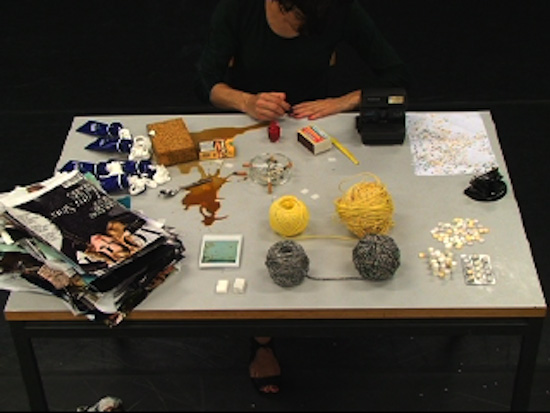Alexandra Bachzetsis
Shedhalle / Exhibitions / The F-Word / Artists / Alexandra Bachzetsis

Alexandra Bachzetsis: A Piece Danced Alone, 2011 (Detail - Foto: Melanie Hoffmann)
Alexandra Bachzetsis (born in 1974, lives in Basel and Zurich) works as an artist, choreographer, and performer. She is a solo dancer of her own pieces as well as a choreographer of dance performances with an ensemble of dancers and musicians. Bachzetsis explores in her choreographic works visual codes of dress and body language, often centring on female stereotypes as fed to us by the visual worlds of popular culture. The object of her analyses, worked out in the most precise terms, and critically reflexive as well as aesthetically complex reflections are media formats such as music videos, television and cinema productions, but also everyday communication as well as the fashion and sex industry.
A Piece Danced Alone, 2011 (Gallery Version)
Performance by (with) Alexandra Bachzetsis and with Anne Pajunen (Live: May 11th, 2012)
Documetation of the performance at Centre d'art contemporain Brétigny, november 8th, 2011.Video documentation: Stéphane Patti.
45 min.
Her two-person piece with the title A Piece Danced Alone explores these very gestures of everyday life and the repertoire of culturally coded body language and to what extent authenticity and performance still differ from one another. Alexandra Bachzetsis presents herself with a fictional artist ego and a doppelganger, whose biographical excess of engagements in comparison to ‘her’ age raise questions of professional artistic self-presentation and social attitudes of expectation. In the 40 minute piece, the two performers dance various solo parts that are conceived in part as competition, in part as imitation, as interpretation and as duet. Competitive behaviour here vies with the theme of friendship and ultimately plays with the impossibility of distinguishing the two individuals. Alexandra Bachzetsis und Anne Pajunen dance in erotically neutral and unisex jeans outfits and trainers that have their background in the fashion of the disco era during the 1970s. The choreographed A Piece Danced Alone cites a vocabulary of body languages that rely on the everyday present, modern dance, and our collective media memory of mainstream entertainment. Bachzetsis and Pajunen act out the gender-stereotypical ideal image of a Marilyn Monroe or Jane Russell from Gentleman Prefer Blondes (1953), or the refraction of such manifest gender images in the androgynous role models of the singer Ian Curtis from Joy Division or the role of Alex Owens in Flashdance. In interpreting titles such as ‘She’s Lost Control’, they explore the studying of movements in contrast to supposedly authentic ecstasy and exuberance, and thus the individual tension between freedom and conformity. In these studies of gestures and codes, also visually confrontational for the audience, Bachzetsis presumes the voyeurism of the beholders as a concept, by performing without a stage or distance from the audience.
 Alexandra Bachzetsis: Rehearsal (Ongoing), 2011 (Video still)
Alexandra Bachzetsis: Rehearsal (Ongoing), 2011 (Video still)
Rehearsal (Ongoing)
2-channel video, 2011
30 min
The video installation Rehearsal (Ongoing) is a choreographed piece divided into exactly parsed events at a table with various utensils. A woman uses and shifts various things on the table: a cigarette, nail polish, skin cream, a fashion magazine, a Polaroid camera, pills, a sponge, a ball of wool, paper with holes punched in it. From this arrangement on a table that combines everything—work, leisure, reflection, household chores, personal hygiene—a possible microcosm of female existence emerges. By repeated, minimal interventions, she changes the still life slowly, but remains in a closed world. The loop of the scene’s events, coupled at two adjacent screens, underscores the act as a permanent practicing, a constant rehearsal. In the endless series of attempts to appropriate that never reach completion and that due to their doubling cannot be separated into authentic and imitated actions, interpretations of individual adaptations and socially normative codes can be read, that also leave open the act of self empowerment and the refraction of this deterministic cycle.
